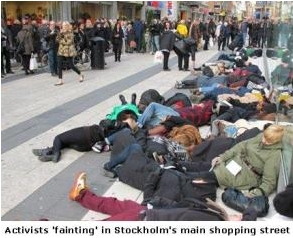
A documentary revealing the miserable conditions faced by Cambodian factory workers producing goods for the fashion retailer H&M was aired on Swedish national television last night. Campaigners and the media are calling on H&M to respond to allegations of poverty pay in the industry.
"The documentary revealed the reality behind the glamorous veneer of fast, cheap fashion sold in H&M stores," said Klaus Melvin Jensen, Coordinator for Clean Clothes Campaign Denmark. "I fear many of H&M's customers will lose their appetite for cheap clothing after seeing this film."
In recent months H&M have held a number of high profile meetings with dignitaries such as the Vice Prime-Minister of Cambodia, and officials from the wage board of Cambodia to call for a higher minimum wage to be implemented for workers. Yet campaigners say that meetings and good intentions are not a sufficient response to the pressing health risks and poverty conditions faced by factory workers.
"Low wages come at a high cost. Last year, over 2400 workers passed out in Cambodian factories due to malnutrition as a direct consequence of low salaries. But H&M, one of Cambodia's main buyers, continues to refuse to pay a living wage to its workers," says Jeroen Merk of the International Clean Clothes Campaign. "This is unacceptable."
The Clean Clothes Campaign Network in collaboration with the Cambodian trade union C.CAWDU launched in September a European-wide campaign called 'No more Excuses', demanding that the company take a proactive role in paying a wage that allows its workers to live with dignity. The campaign aims to draw attention to the fact that whereas the minimum wage for garment workers is USD 61 a month this amounts to less than 25% of a living wage in Cambodia.
In an attempt to respond to the documentary's findings, H&M announced plans on for a project to strengthen union – management dialogue at some production units in Cambodia. Campaigners and unionists have welcomed this step, but have expressed concern that it offers no guarantee of living wages for workers who need them most.
Source:
http://www.fibre2fashion.com/news/apparel-news/newsdetails.aspx?news_id=117364





